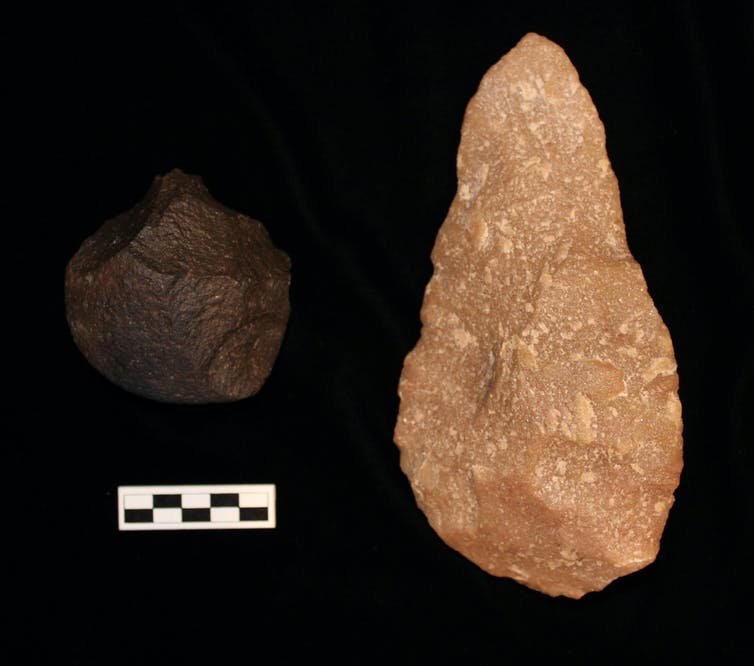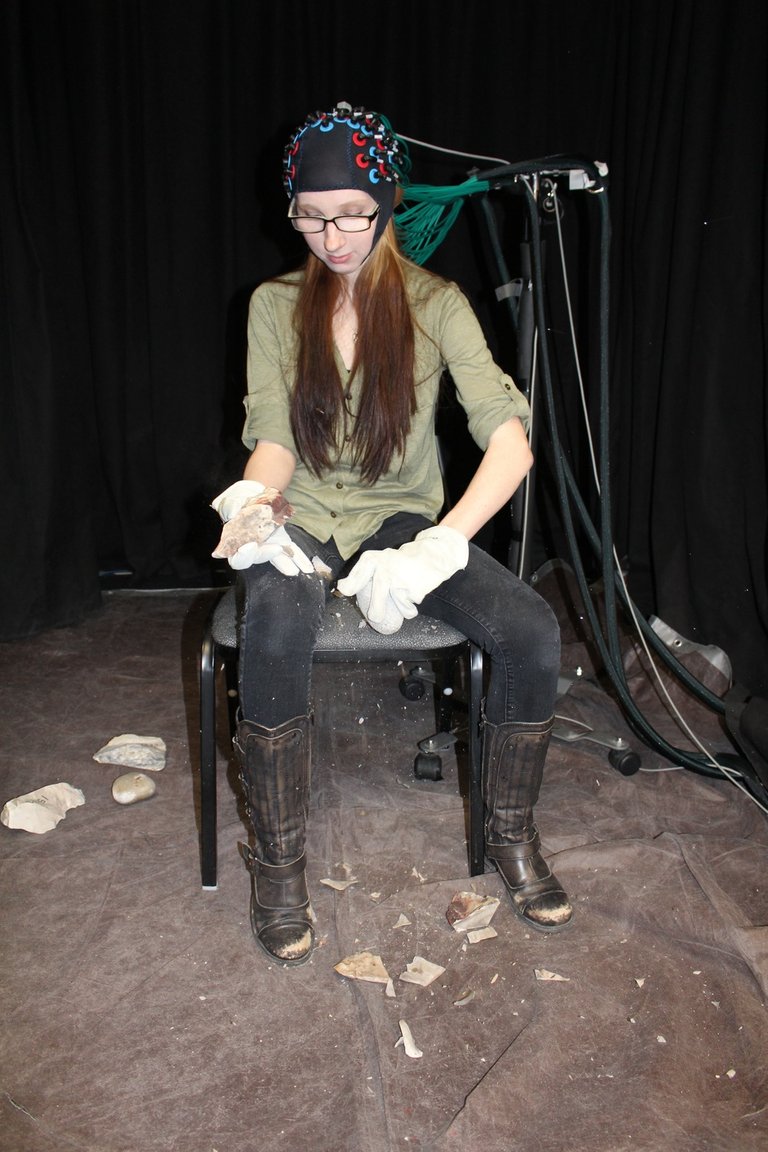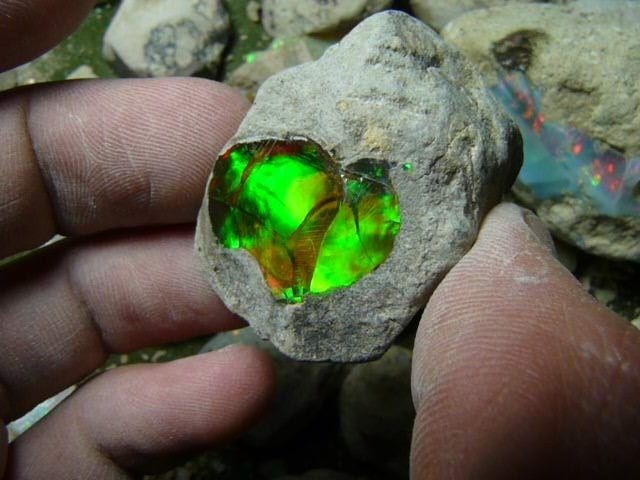Humans are the ultimate throw away species.
We have been picking up discarded tools for millennia and there is even signs of recycling in the archaeological record.
Where good tool making material is scarce its not uncommon to find older tools that have been remade into new tools. Sometimes there may be hundreds of thousand, even millions of years between the time the first tool was discarded and then picked up and remade into something else.
These discarded tools can tell us a bit about those who made them.
It doesn't take a rocket scientist to figure out that there is quite a huge difference in the level of skill, dexterity and brain power required to manufacture the tool on the right in comparison to the tool on the left.
The one on the left (Oldowan) is a pebble that has been crudely bashed on one side to produce a simple sharp edge.
The one on the right (Acheulian) has been carefully planned and worked to produce a flattened instrument with a fine cutting edge all round the perimeter of the stone.

Its not surprising then that the cruder tools are found before the more intricate ones.
There must have been some fantastic advancements to enable the latter tools to be manufactured.
Up till now its simply been educated guesswork as to how this occurred and which homonin species is responsible for these, since there are a couple of overlaps.
Through lots of effort we modern humans have been able to reverse engineer how these tools were created, partially by trial and error and partly by observing and copying peoples that still manufacture stone age tools today.
But to figure out what is really going on brain imaging is being brought on. Participants are having their brain activity levels and areas monitored while they manufacture modern equivalents. This enables researchers to see exactly what areas of the brain were required to manufacture tools and what areas would have been stimulated by these repetitive processes.
Language was thought by previous studies to be key.

Each of the subjects who participated in this study attended multiple training sessions to learn how to make Oldowan and Acheulian tools before going in for the final test – making tools while hooked up to the fNIRS system.
We needed to control for language in the design of our experiment to test the idea that language and tool-making share a common circuit in the brain. So we divided the participants into two groups: One learned to make stone tools via video with language instructions; the other group learned via the same videos, but with the audio muted, so without language.
If language and tool-making truly share a co-evolutionary relationship, then even those participants who were placed in the nonverbal group should still use language areas of the brain while making a stone tool. This is the result we should expect if language processing and stone tool production require the same neural circuitry in the brain.
The results were insightful...
What we found was that only the participants who learned to make stone tools with language instruction used language processing areas of the brain. This probably means that they were recalling verbal instructions they’d heard during their training sessions. That explains why earlier studies that did not control for language instruction in their experiment design found that stone tool production activates language processing areas of the brain. Those language areas lit up not because of anything intrinsic to making stone tools, but because while participants worked on the tools they also were likely playing back in their minds the language-based instruction they’d received.
Our study showed that people could make stone tools without activating language-related brain circuits. That means, then, that we can’t confidently state at this point that stone tool manufacture played a major role in the evolution of language. When exactly language made its appearance is therefore still a mystery to be solved.
It's a bit of a shame we no longer make many of our personal tools... I have a paleo hide scraper that I use for craft work as it fits my hand so perfectly! Yes I've used it to scrape hides and also to clean gourds.
One size does not fit all!!
Yup, the custom nature of stone tools is very apparent. some just fit perfectly in your hand others don't, some are made for lefties but most for right handed use.
To answer the question: I personally got the experience that it is all about how you use the stone. If you are a little child and you throw a big stone in the air and end up hurting yourself because of gravity, you learn your lesson for the rest of your life.. ;)
Nice personal illustration
Man is a recycler of what his predecessors have done, the only difference is that it used to be manual and simple but now uses modern technology and science. In essence what it wants to achieve looks the same in ancient times and now. Ancient humans used stone as a weapon but now humans use iron and even the hardest steel, whereas the desire of the maker is the same weapon. A good post and an inspiration and for us all
It is indeed an inspiration for all of us here on steemit.
I loved the way just a stone is put up into a beautiful article. We do not usually think of writing an article just based on a stone, do we? An excellent approach and a different one too.
"In other classes of animals, the individual advances from infancy to age or maturity; and he attains, in the compass of a single life, to all the perfection his nature can reach: but, in the human kind, the species has progress as well as the individual; they build on every subsequent foundation every laid." -Adam Ferguson, Essay on Civil Society.
When inwas 8 years old we went on a trip to see the remains and tools from the stone age era at a place called Kariandusi in Kenya. It was one of my most memorable trips of my childhood and really made me love history from a young age
Must have been great, finding these tools close to our house was what got me started.
Wow, such an informative piece. Who would've thought of this that our part of brain for language is recycling and based on the instructions received while preparing for a task,the same part help us in this archeological response. @gavvet, this piece is really educative and am glad to learning it from you. Bless
Very fascinating and quite a clever study this one!
That's why I don't feel smart at all... Even though I'm using 3 laguages...hahaha
People who have made those stones must have really put lot of energy and effort into it, without hard work this could'nt have been possible.
This stone tell the story of supmen and other dc heroes

Nice opals
Very interesting and well written article. These experiences are incredible. Thank you very much for a great day
Congratulations @gavvet!
Your post was mentioned in my hit parade in the following categories:
Geat work my dear so I vote you
This is an amazing post my friend, we neglected the little things in life, but they actually hold much more than we think, sadly that's how we've made life to be here on earth.
Cheers and much love from me.
-Goldie
Fascinating article. I've always been really interested in stone tools and their manufacture and have tried (unsuccessfully to make some myself). Really interesting study.
Jup, not easy. especially if you don't have the right material
I think geology is a scientific field that its not value. In my opinion its one of the most interesting fields that you can learn. In the stones is hidden the secret of humanity but geology has a lot of field where you can stand out:
Speleology
Stratigraphy
Oil Geology
Economic Geology
Structural Geology
Gemology
Historical geology
Planetary Geology
Regional Geology
Geomorphology
Geochemistry
Geophysics
Hydrogeology
Mineralogy
Paleontology
Petrology
Sedimentology
Seismolog
Tectonics
Vulcanology
informative piece, i wonder what record our generation would leave behind....probably it would be dial up cord or cassette player
So much information in just one stone!
interesting post
thanks for sharing
I like very much this post. Thank you @gavvet. Resteemed :)
feeling inspired :) honestly speaking, everything on this globe can teach us something. you only need a lion's heart to accept your mistake and lean from it.
eg: a small ant teaches us to work harder and to be persistent :)
interesting post
Amazing analysis. I always thought that progression of man (homo-sapien and his ancestors) developed their abilities progressively and language formed a key factor in their evolution to a species using advanced tools and weapons. Thanks for sharing. Was intriguing.
While I am here, may I make a request - When you have time, please do take a look at my blog where I tried my hand at writing - a chain of thoughts on solitude - inspired by my wildlife picture instead of just putting the picture. Thanks
https://steemit.com/life/@vm2904/solitude-not-lonliness-a-boon-not-a-bane
Also - if you dont mind please participate in this contest for supporting minnows - https://steemit.com/life/@vm2904/caption-contest-1-wildlife-awareness-please-participate-and-support
Very interesting post and it really does exclaim how so much history is written in the little things we do.
Thank you for this.
this.
Worth of .
.
this article was boring. make a better one.
thanks for your honest feelings, rocks and stones are not for everyone
very interesting dear
resteemed+upvote+follow
@gavvet
So easy a caveman can do it. :D
That's what everybody thinks until they try... Its hard.
they still use stones in the the middle east...
naughty, naughty
very nice ,
i posted a beautiful place , check my last post , tnx.
Good post @gavvet, I love the stone ring and in my residence many types of agate.
Now the latest discovery is the strongest evidence yet that these early humans did have the ability to make and use tools rather than being primative creatures.
that was the reason-"Early human history was written with stone tools."!
As the article brings out, the complexity of the tool in the making is a factor. I am thinking that it would be easy to see some trees and figure out how to make a house of them. - even chimpanzees are capable of something of the sort. When it comes to sharpening a rock, it's more complicated perhaps, but still wouldn't require much verbal instruction, if any. If, on the other hand, we are talking about more advanced tool making, which might go as far as metallurgy, for example, then verbal instruction is absolutely necessary. Some things just can't be taught to apes. Some things are less intuitive than others. For example, what would make a hypothetical cave man figure out how to melt rock to get iron from it?
I appreciate the article, and agree with the conclusion; good food for thought.
Lead melts at campfire heat.
That's a fact and I agree. But how many lead rocks have you seen lying around, ready to be melted in a campfire? So many details are involved in the technology that can't be passed on without the means of verbal communication.
Metallurgy definitely followed verbal in the sequence of things
Well i didnt know that
Very interesting information. Thank you for sharing.
My most favourite part of geography in high school :P
yup, geography was my favorite subject at high school
Keep making these posts. I do really enjoy them. I have a fascination with history, archaeology and anthropology...
I'm glad you like them
very interesting and well researched and written post. :))
thanks
you are welcome
It teaches you how to survive!
interesting article
What kind of tool can you make using Ebonics? LOL
There is an evolutionary curve in every field, and human evolution is both fascinating and puzzling.
thanks for sharing!
Brilliant article. It's amazing we can get this for free on Steemit. Thank you very much for sharing
Hey @gavvet, nice share. I'm a new Steemian who just signed up. It would be great if you would have a quick look at my blog and click the follow button if my writing resonates with you. Much appreciated!
Thank you for sharing, nice post!
An interesting post about stone and its mysteries
Interesting read! I think I could make a stone tool from reading this article.
Thanks for the share! I got told they went hand in hand, so it's interesting to know they actually don't!
I guess it has a lot to do with trial and error, just like these cute little fellows,and finetuning the process and learning it from others doing it:
Still wonder when exactly language did come into play though! :)
Yup, more research and a bit of luck before we uncover that one, unfortunately spoken words do not fossilize.
Love this post and I learned a great deal from your post. Thank You! Very fascinating.